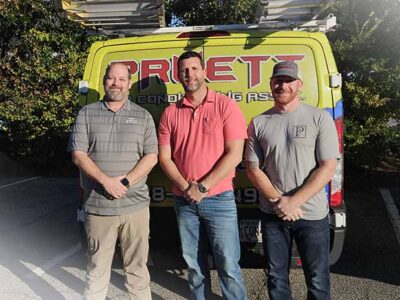
Are you deciding to replace or upgrade the heating system in your Eastman, Georgia, home? If so, you may find yourself faced with a wide range of possible options. Choosing the best heating system for your home will mean considering numerous factors. To help with the decision process, it’s critical to learn the pros and cons of each type of heating system.
Forced Air Systems
A forced-air heating system is one of the most popular choices on the market. In these types of systems, the furnace heats the air. The blower then distributes it through the system of ducts in your home. These systems are easy and inexpensive to install and operate. The only drawbacks to these systems are that they can be noisy when operating, require regular maintenance, and lose their efficiency over the years.
Radiators
Radiators are systems typically found in older homes. These systems operate off of steam heat that comes from boilers. The steam will run along baseboards and up to vertical units that sit in the various rooms in your home. These systems are quiet during operation and can be extremely energy efficient. The main drawbacks with these types of systems are that the:
- Units will take up a large portion of the room
- Heat doesn’t always reach to the far corners
- Units can become hot when running, so they should never be blocked
Radiant Heat Flooring
Radiant in-floor heating is a popular option for those who enjoy having warm floors during the colder months. The system works with a boiler that heats water, which then flows through pipes in the floor. The rising heat creates warmth in the room. Pros of this type of system are that they’re incredibly energy efficient and they don’t require units that take up floor space. They also provide more consistent heating of a room over traditional radiators and require little maintenance. The main drawback is that they can be costly to install and repair.
Geothermal Heating
Geothermal energy works by drawing off the constant core temperature of the Earth, which you can use to both heat and cool your home. The system works by transferring warmth into your home in the colder months and drawing the heat out during warmer ones. It may be a difficult to decide whether you want to upgrade to a geothermal system because geothermal energy can come with a high upfront cost. It can also require excavation, and it’s not the best option for every climate. However, geothermal systems have many pros, such as the fact that they are:
- Environmentally friendly and produce no pollution
- Extremely efficient and safer to operate
- Require little maintenance
- Produce lower energy bills
Ductless Systems
Ductless systems work by attaching an outdoor unit to various indoor units in your home through piping in the walls. These systems allow for independent operation and control of temperature with each indoor unit. As a result, they allow you to create specific temperature zones.
Ductless systems provide homeowners with many benefits like improved comfort. They allow multiple rooms to be different temperatures and prevent hot and cold spots throughout your home.
Since ductless systems don’t require ductwork, they can be extremely energy efficient. These systems can also be less costly to install for new builds as there’s no need to outfit the house with ductwork. This lack of ductwork also provides for better indoor air quality in your home since you won’t have to worry about the buildup of dust and dirt in the ductwork.
With so many options to choose from, picking the right heating system can seem like a daunting experience. By looking at the pros and cons, you can help narrow your options and begin getting estimates. If you’re thinking about installing a new heating system, contact Pruett Air Conditioning at 478-374-1481 today to help find the best model for your home.
Image provided by Shutterstock

